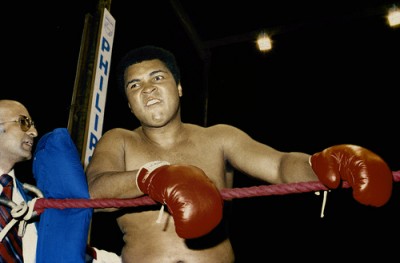Trump considers pardoning late boxer Ali, whose conviction was overturned in 1971

Muhammad Ali/Mark Reinstein (Shutterstock.com).
Updated: President Donald Trump said Friday that he is considering a pardon for the late boxer Muhammad Ali.
If Trump pardons Ali, it would be a symbolic move, report the Washington Post and USA Today. Ali’s conviction for evading the draft was overturned by the U.S. Supreme Court in 1971. And in 1977, President Jimmy Carter gave blanket amnesty to people convicted of draft evasion during the Vietnam War
Ali, who suffered from Parkinson’s disease for more than 30 years, died at June 2016 at 74.
Ali’s former lawyer, Ron Tweel, released a statement on Friday saying a pardon isn’t needed, the Associated Press reports. “We appreciate President Trump’s sentiment, but a pardon is unnecessary,” he said. “The U.S. Supreme Court overturned the conviction of Muhammad Ali in a unanimous decision in 1971. There is no conviction from which a pardon is needed.”
Last month, Trump pardoned the late boxer Jack Johnson, who was convicted for transporting a white woman across state lines over 100 years ago.
Trump told reporters that he has a list of 3,000 names for possible clemency. “The pardons are very positive things for a president,” Trump said. “The power to pardon is a beautiful thing.”
SCOTUSblog takes a historical look at Ali’s case in a 2016 post that includes information on internal deliberations from a former Supreme Court law clerk, Tom Krattenmaker. The ABA Journal also looked at the case in 2015.
Ali had told the draft board that he was a pacifist opposed to fighting in the Vietnam War because of his religion. The draft board turned down his application for status as a conscientious objector in February 1967, and he appealed. The case was referred to the U.S. Justice Department for an advisory recommendation.
Ali told the hearing officer that his religious teachings held that it was wrong to take part in any war, “unless declared by Allah himself.” The hearing officer determined Ali had a sincere religious objection to war, but the Justice Department did not tell a Kentucky appeal board about the hearing officer’s conclusion. The appeal board ruled against Ali. He was convicted of draft evasion, and a federal appeals court affirmed the conviction.
The conscientious objector statute required the person seeking to avoid the draft to object to war in any form, not just the Vietnam War. The initial issue was whether Ali was opposed to all war, given his acknowledgement that that he would fight a holy war to defend Islam.
A majority of the justices initially indicated they would affirm the conviction, but the justice assigned to write the opinion, John Marshall Harlan, reportedly changed his mind after law clerks said Nation of Islam texts indicated a holy war was abstract and dependent on future events unlikely to occur.
Justice Potter Stewart suggested a different ground for a decision: The Justice Department had wrongly advised the appeal board that Ali’s beliefs were not religiously based and not sincerely held. Because it was impossible to tell if the appeal board relied on that ground, the conviction had to be reversed. The court relied on that reasoning in a per curiam opinion written by Stewart, according to the SCOTUSblog report.
The June 1971 decision was Clay v. United States.
Updated with reaction from Ali’s former lawyer at 10:02 a.m.



